Fleurs du Mal Magazine


Or see the index
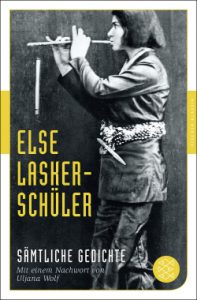
Ich weiß
Ich weiß, daß ich bald sterben muß
Es leuchten doch alle Bäme
Nach langersehtem Julikuß –
Fahl werden meine Träume –
Nie dichtete ich einen trüberen Schluß
In den Büchern meiner Reime.
Eine Blume brichst du mir zum Gruß –
Ich liebte sie schon im Keime.
Doch ich weiß, daß ich bald sterben muß.
Mein Odem schwebt über Gottes Fluß
Ich setze leise meinen Fuß
Auf den Pfad zum ewigen Heime.
Else Lasker-Schüler
(1869 – 1945)
Ich weiß
• fleursdumal.nl magazine
More in: #Editors Choice Archiv, Archive K-L, Archive K-L, Lasker-Schüler, Else
Wroeging
Hij verzamelde geld. Oud geld, nieuw geld, geld. Zijn huis was van geld, zijn tafel, zijn stoel, zijn tv, zijn vrouw, zijn zoon, zijn baby, zijn 06, zijn laptop, zijn auto, zijn tuin, zijn muren, zijn ramen, zijn huidige geld, zijn toekomstige geld, zijn wereld, alles van geld. In een droom zag hij zichzelf, zijn armen griezelig veranderd in briefjes van tien, zijn ogen zich harden tot munten van twee, zijn hart tot toren van munten verhard, zijn beide handen uit munten gesmeed. Zijn vrouw die op de achtergrond zijn portemonnaie kust. Hij begon te huilen als een kind dat wakker schrikt in het geloof dat zijn pasgedroomde nachtmerrie werkelijkheid is, tot hopelijk een lieve mama deze ontkent en hem geruststelt. Hij huilde steeds harder en harder en harder tot en met de volwassene die ineens voelt, weet dat zijn nachtmerrie zijn ware nachtmerrie blijkt.
Freda Kamphuis
Wroeging
Gedicht
• fleursdumal.nl magazine
More in: #Editors Choice Archiv, Archive K-L, Archive K-L, Kamphuis, Freda

Tegemoet
Als lange neus naar zware, logge
aangemeerden langs de kade
zoeft lichtgewicht ze vliegensvlug voorbij
te recht en strak om dobberend dier te zijn
niet in harmonie met kwetterende eenden
ook niet met de tetterende fietser vlak daarnaast.
Acht peddels links, acht peddels rechts
daartussenin bewegen acht gesmeerde mannen
ritmisch met hun sterke armen mee tot één geheel.
Vlak voor brug worden zij rietstengels, die buigen,
niet door wind maar laagste ijzer van de brug is hard
van bovenaf kijk ik één tel op rij gezichten neer
als stille, stoere streep gaan zij in al hun pracht ten onder.
Freda Kamphuis
Tegemoet
Gedicht
• fleursdumal.nl magazine
More in: Archive K-L, Archive K-L, Kamphuis, Freda
Ongekend ontroerend, dat is De dieren in mij, de eerste dichtbundel van Delphine Lecompte. Ze kreeg er de C. Buddingh’-prijs voor.
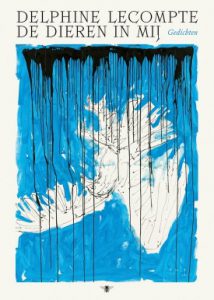 Hier toonde iemand zich even strijdbaar als kwetsbaar met gedichten die een diepe indruk achterlaten. Zo anders van toon dan haar gevierde, exuberante recente werk. De dieren in mij is een bundel die een plaats afdwingt in de kast en het hart van iedere poëzieliefhebber. Het is Lecompte zonder opsmuk. Ook dan is haar werk beeldschoon.
Hier toonde iemand zich even strijdbaar als kwetsbaar met gedichten die een diepe indruk achterlaten. Zo anders van toon dan haar gevierde, exuberante recente werk. De dieren in mij is een bundel die een plaats afdwingt in de kast en het hart van iedere poëzieliefhebber. Het is Lecompte zonder opsmuk. Ook dan is haar werk beeldschoon.
Delphine Lecompte (1978) debuteerde in 2004 in het Engels met de roman Kittens in the Boiler, daarna schakelde ze over naar gedichten in haar moedertaal. Voor haar debuutbundel De dieren in mij (2009) ontving ze de C. Buddingh’-prijs en de Prijs voor Letterkunde van de Provincie West-Vlaanderen. In 2015 verscheen Dichter, bokser, koningsdochter, dat genomineerd werd voor de VSB Poëzieprijs. Voor The Best of Delphine Lecompte (2018) selecteerde ze zelf de greatest hits uit haar rijke oeuvre, dat met Vrolijke verwoesting (2019) negen dichtbundels omvat. In 2020 maakte Lecompte haar debuut als prozaïste met Beschermvrouwe van de verschoppelingen. In oktober 2021 verscheen Beschermvrouwe van de verschoppelingen II, waarin de waanzin andermaal welig tiert en dat naar eigen zeggen dubbel zo goed is. In 2022 verscheen het derde deel.
De dieren in mij
Door Delphine Lecompte
ISBN: 9789403180410
NUR: 306
Type: Paperback
Uitgever: De Bezige Bij
Verschijningsdatum: 15-09-2022
Prijs: 21,99 euro
• fleursdumal.nl magazine
More in: - Book News, - Bookstores, Archive K-L, Archive K-L, Buddingh', Cees, Lecompte, Delphine
Anything the Landlord Touches was Emma Lew’s second collection to be published in Australia.
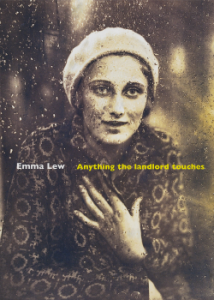 The book won the C.J. Dennis Prize for Poetry (the Victorian State Premier’s award for poetry), and the Judith Wright Calanthe Award (the Queensland Premier’s Prize for Poetry), two of the main literary prizes in the country, and was also short-listed for The Age award and the NSW and South Australian Premier’s Literary Prizes.
The book won the C.J. Dennis Prize for Poetry (the Victorian State Premier’s award for poetry), and the Judith Wright Calanthe Award (the Queensland Premier’s Prize for Poetry), two of the main literary prizes in the country, and was also short-listed for The Age award and the NSW and South Australian Premier’s Literary Prizes.
Emma Lew lives in Melbourne. Her first collection of poems, The Wild Reply (1997), won the Mary Gilmore Award and was joint winner of the Age Poetry Book of the Year Award. Her second collection, Anything the Landlord Touches (2002), won the Victorian Premier’s C. J. Dennis Prize for Poetry and the Queensland Premier’s Judith Wright Calanthe Prize for Poetry. A selection of German language translations of her poems by Mirko Bonne was published under the title Nesselgesang in 2008. Crow College: New and Selected Poems was published by Giramondo in 2019.
Anything the Landlord Touches
by Emma Lew
Poetry
Giramondo Publishing Australia
96 pages
Paperback
21 x 15 cm
2002
ISBN 0957831161
$22.00
• fleursdumal.nl magazine
More in: #Editors Choice Archiv, - Book News, - Bookstores, Archive K-L, Archive K-L
No art has been denounced as often as poetry. It’s even bemoaned by poets: “I, too, dislike it,” wrote Marianne Moore.
“Many more people agree they hate poetry,” Ben Lerner writes, “than can agree what poetry is. I, too, dislike it and have largely organized my life around it and do not experience that as a contradiction because poetry and the hatred of poetry are inextricable in ways it is my purpose to explore.”
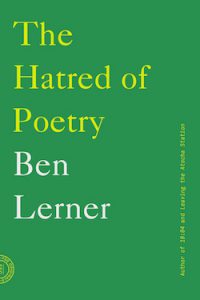 In this inventive and lucid essay, Lerner takes the hatred of poetry as the starting point of his defense of the art. He examines poetry’s greatest haters (beginning with Plato‘s famous claim that an ideal city had no place for poets, who would only corrupt and mislead the young) and both its greatest and worst practitioners, providing inspired close readings of Keats, Dickinson, McGonagall, Whitman, and others.
In this inventive and lucid essay, Lerner takes the hatred of poetry as the starting point of his defense of the art. He examines poetry’s greatest haters (beginning with Plato‘s famous claim that an ideal city had no place for poets, who would only corrupt and mislead the young) and both its greatest and worst practitioners, providing inspired close readings of Keats, Dickinson, McGonagall, Whitman, and others.
Throughout, he attempts to explain the noble failure at the heart of every truly great and truly horrible poem: the impulse to launch the experience of an individual into a timeless communal existence. In The Hatred of Poetry, Lerner has crafted an entertaining, personal, and entirely original examination of a vocation no less essential for being impossible.
Ben Lerner was born in Topeka, Kansas, in 1979. He has received fellowships from the Fulbright, Guggenheim, Howard, and MacArthur Foundations. His first novel, Leaving the Atocha Station, won the 2012 Believer Book Award, and excerpts from 10:04 have been awarded The Paris Review’s Terry Southern Prize. He has published three poetry collections: The Lichtenberg Figures, Angle of Yaw (a finalist for the National Book Award for Poetry),and Mean Free Path. Lerner is a professor of English at Brooklyn College.
The Hatred of Poetry
by Ben Lerner
Publisher: FSG Originals
First Edition (June 7, 2016)
Language : English
Paperback
96 pages
ISBN-10 : 0865478201
ISBN-13 : 978-0865478206
$ 8.99
• fleursdumal.nl magazine
More in: #Editors Choice Archiv, #Modern Poetry Archive, - Book News, - Book Stories, Archive K-L, Archive K-L, LITERARY MAGAZINES
Deaf Republic opens in an occupied country in a time of political unrest. When soldiers breaking up a protest kill a deaf boy, Petya, the gunshot becomes the last thing the citizens hear—all have gone deaf, and their dissent becomes coordinated by sign language.
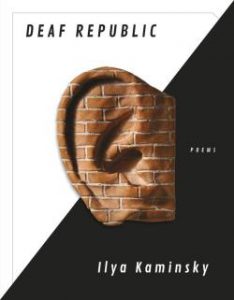 The story follows the private lives of townspeople encircled by public violence: a newly married couple, Alfonso and Sonya, expecting a child; the brash Momma Galya, instigating the insurgency from her puppet theater; and Galya’s girls, heroically teaching signs by day and by night luring soldiers one by one to their deaths behind the curtain.
The story follows the private lives of townspeople encircled by public violence: a newly married couple, Alfonso and Sonya, expecting a child; the brash Momma Galya, instigating the insurgency from her puppet theater; and Galya’s girls, heroically teaching signs by day and by night luring soldiers one by one to their deaths behind the curtain.
At once a love story, an elegy, and an urgent plea—Ilya Kaminsky’s long-awaited Deaf Republic confronts our time’s vicious atrocities and our collective silence in the face of them.
Ilya Kaminsky was born in the former Soviet Union and is now an American citizen. He is the author of a previous poetry collection, Dancing in Odessa, and coeditor of The Ecco Anthology of International Poetry. He has received a Whiting Award, a Lannan Literary Fellowship, and a Guggenheim Fellowship, and was named a finalist for the Neustadt International Prize for Literature. His work has been translated into more than twenty languages.
Deaf Republic
Poems
by Ilya Kaminsky
Publisher: Graywolf 2019
Language: English
Paperback: 96 pages
ISBN-10 : 1555978312
ISBN-13 : 978-1555978310
Paperback $10.79
• fleursdumal.nl magazine
More in: #Editors Choice Archiv, - Book Lovers, Archive K-L, Archive K-L
An astonishing collection about interconnectedness—between the human and nonhuman, ancestors and ourselves—from National Book Critics Circle Award winner, National Book Award finalist and U.S. Poet Laureate Ada Limón.
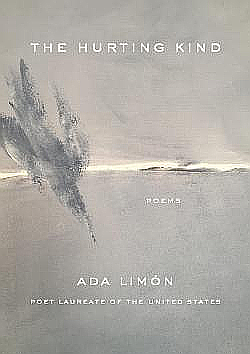 “I have always been too sensitive, a weeper / from a long line of weepers,” writes Limón.
“I have always been too sensitive, a weeper / from a long line of weepers,” writes Limón.
“I am the hurting kind.”
What does it mean to be the hurting kind?
To be sensitive not only to the world’s pain and joys, but to the meanings that bend in the scrim between the natural world and the human world?
To divine the relationships between us all?
To perceive ourselves in other beings—and to know that those beings are resolutely their own, that they “do not / care to be seen as symbols”?
With Limón’s remarkable ability to trace thought, The Hurting Kind explores those questions—incorporating others’ stories and ways of knowing, making surprising turns, and always reaching a place of startling insight.
These poems slip through the seasons, teeming with horses and kingfishers and the gleaming eyes of fish.
And they honor parents, stepparents, and grandparents: the sacrifices made, the separate lives lived, the tendernesses extended to a hurting child; the abundance, in retrospect, of having two families.
Along the way,we glimpse loss. There are flashes of the pandemic, ghosts whose presence manifests in unexpected memories and the mysterious behavior of pets left behind. But The Hurting Kind is filled, above all, with connection and the delight of being in the world.
“Slippery and waddle thieving my tomatoes still / green in the morning’s shade,” writes Limón of a groundhog in her garden, “she is doing what she can to survive.”
Ada Limón grew up in Glen Ellen and Sonoma, California. A graduate of New York University’s MFA Creative Writing Program, she has received fellowships from the Provincetown Fine Arts Work Center, the New York Foundation for the Arts, and won the Chicago Literary Award for Poetry. She is the author of three books of poetry, Lucky Wreck (Autumn House Press, 2006), This Big Fake World (Pearl Editions, 2007), and Sharks in the Rivers (Milkweed Editions, 2010). She is currently at work on a novel, a book of essays, and a new collection of poems. Ada Limón became the 24th Poet Laureate of the United States in July of 2022.
The Hurting Kind
by Ada Limón (Author)
Publisher: Milkweed Editions
May 10, 2022
Language: English
Hardcover: 120 pages
ISBN-10: 1639550496
ISBN-13: 978-1639550494
$17.99
• fleursdumal.nl magazine
More in: #Editors Choice Archiv, #Modern Poetry Archive, - Book News, Archive K-L, Archive K-L
Marina Keegan (1989-2012) was an award-winning author, journalist, playwright, poet, actress, and activist.
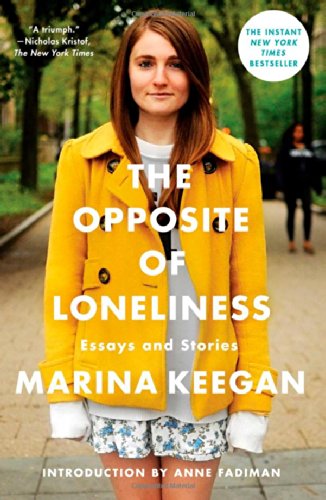
Her nonfiction has been published in The New York Times; her fiction has been published on NewYorker.com, and read on NPR’s Selected Shorts; her musical, Independents, was a New York Times Critics’ Pick. Marina’s final essay for The Yale Daily News, “The Opposite of Loneliness”, became an instant global sensation, viewed by more than 1.4 million people from 98 countries.
‘A generation-defining collection published posthumously…Her voice is relevant, sharp, fresh, unfiltered and poetic, with a dry wit. You can dive in and out of her questioning and her musings and meanderings. So much promise’, Jenna Coleman, star of Doctor Who and Victoria.
Marina Keegan’s star was on the rise when she graduated from Yale in May 2012. She had a play that was to be produced at the New York International Fringe Festival and a job waiting for her at the New Yorker. Tragically, five days after graduation, Marina died in a car crash.
As her family, friends and classmates, deep in grief, joined to create a memorial service for Marina, her unforgettable last essay for the Yale Daily News, ‘The Opposite of Loneliness’, went viral, receiving more than 1.4 million hits.
She had struck a chord. Even though she was just 22 when she died, Marina left behind a rich, expansive trove of prose that, like her title essay, captures the hope, uncertainty and possibility of her generation. The Opposite of Loneliness is an assemblage of Marina’s essays and stories that articulates the universal struggle we all face as we work out what we aspire to be and how we can harness our talents to make an impact on the world.
The Opposite of Loneliness:
Essays and Stories
by Marina Keegan (Author),
Anne Fadiman (Introduction)
Publisher: Scribner,
Simon & Schuster Ltd
First Edition (April 8, 2014)
Language: English
240 pages
ISBN-10 : 147675361X
ISBN-13 : 978-1476753614
Price: Paperback € 19,99
Marina Keegan (1989-2012)
American author, playwright, journalist, actress and poet
Born: Marina Evelyn Keegan
October 25, 1989
Boston, Massachusetts
Died: May 26, 2012 (aged 22)
Cape Cod (USA)
Alma mater; Yale University
The Opposite of Loneliness:
Essays and Stories (2014)
American literature
For more information, visit: TheOppositeofLoneliness.com
• fleursdumal.nl magazine
More in: #Biography Archives, #Editors Choice Archiv, - Book News, Archive K-L, Archive K-L, In Memoriam, Marina Keegan, THEATRE
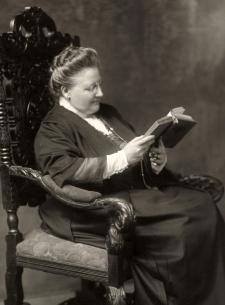
Lead Soldiers
The nursery fire burns brightly, crackling in cheerful
little explosions
and trails of sparks up the back of the chimney. Miniature
rockets
peppering the black bricks with golden stars, as though a gala
flamed a night of victorious wars.
The nodding mandarin on the bookcase moves his
head forward and back, slowly,
and looks into the air with his blue-green eyes. He stares
into the air
and nods — forward and back. The red rose in his hand
is a crimson splash
on his yellow coat. Forward and back, and his blue-green
eyes stare
into the air, and he nods — nods.
Tommy’s soldiers march to battle,
Trumpets flare and snare-drums rattle.
Bayonets flash, and sabres glance —
How the horses snort and prance!
Cannon drawn up in a line
Glitter in the dizzy shine
Of the morning sunlight. Flags
Ripple colours in great jags.
Red blows out, then blue, then green,
Then all three — a weaving sheen
Of prismed patriotism. March
Tommy’s soldiers, stiff and starch,
Boldly stepping to the rattle
Of the drums, they go to battle.
Tommy lies on his stomach on the floor and directs his columns.
He puts his infantry in front, and before them ambles a mounted
band.
Their instruments make a strand of gold before the scarlet-tunicked
soldiers,
and they take very long steps on their little green platforms,
and from the ranks bursts the song of Tommy’s soldiers marching
to battle.
The song jolts a little as the green platforms stick on the thick
carpet.
Tommy wheels his guns round the edge of a box of blocks, and places
a squad of cavalry on the commanding eminence of a footstool.
The fire snaps pleasantly, and the old Chinaman nods — nods. The
fire makes
the red rose in his hand glow and twist. Hist! That
is a bold song
Tommy’s soldiers sing as they march along to battle.
Crack! Rattle! The sparks
fly up the chimney.
Tommy’s army’s off to war —
Not a soldier knows what for.
But he knows about his rifle,
How to shoot it, and a trifle
Of the proper thing to do
When it’s he who is shot through.
Like a cleverly trained flea,
He can follow instantly
Orders, and some quick commands
Really make severe demands
On a mind that’s none too rapid,
Leaden brains tend to the vapid.
But how beautifully dressed
Is this army! How impressed
Tommy is when at his heel
All his baggage wagons wheel
About the patterned carpet, and
Moving up his heavy guns
He sees them glow with diamond suns
Flashing all along each barrel.
And the gold and blue apparel
Of his gunners is a joy.
Tommy is a lucky boy.
Boom! Boom! Ta-ra!
The old mandarin nods under his purple umbrella. The
rose in his hand
shoots its petals up in thin quills of crimson. Then
they collapse
and shrivel like red embers. The fire sizzles.
Tommy is galloping his cavalry, two by two, over the floor. They
must pass
the open terror of the door and gain the enemy encamped under the
wash-stand.
The mounted band is very grand, playing allegro and leading the
infantry on
at the double quick. The tassel of the hearth-rug has
flung down
the bass-drum, and he and his dapple-grey horse lie overtripped,
slipped out of line, with the little lead drumsticks glistening
to the fire’s shine.
The fire burns and crackles, and tickles the tripped
bass-drum
with its sparkles.
The marching army hitches its little green platforms
valiantly, and steadily
approaches the door. The overturned bass-drummer, lying
on the hearth-rug,
melting in the heat, softens and sheds tears. The song
jeers
at his impotence, and flaunts the glory of the martial and still
upstanding,
vaunting the deeds it will do. For are not Tommy’s soldiers
all bright and new?
Tommy’s leaden soldiers we,
Glittering with efficiency.
Not a button’s out of place,
Tons and tons of golden lace
Wind about our officers.
Every manly bosom stirs
At the thought of killing — killing!
Tommy’s dearest wish fulfilling.
We are gaudy, savage, strong,
And our loins so ripe we long
First to kill, then procreate,
Doubling so the laws of Fate.
On their women we have sworn
To graft our sons. And overborne
They’ll rear us younger soldiers, so
Shall our race endure and grow,
Waxing greater in the wombs
Borrowed of them, while damp tombs
Rot their men. O Glorious War!
Goad us with your points, Great Star!
The china mandarin on the bookcase nods slowly, forward and back—
forward and back — and the red rose writhes and wriggles,
thrusting its flaming petals under and over one another like tortured
snakes.
The fire strokes them with its dartles, and purrs at them,
and the old man nods.
Tommy does not hear the song. He only sees the beautiful,
new,
gaily-coloured lead soldiers. They belong to him, and
he is very proud
and happy. He shouts his orders aloud, and gallops his
cavalry past the door
to the wash-stand. He creeps over the floor on his hands
and knees
to one battalion and another, but he sees only the bright colours
of his soldiers and the beautiful precision of their gestures.
He is a lucky boy to have such fine lead soldiers to enjoy.
Tommy catches his toe in the leg of the wash-stand, and jars the
pitcher.
He snatches at it with his hands, but it is too late. The
pitcher falls,
and as it goes, he sees the white water flow over its lip. It
slips
between his fingers and crashes to the floor. But it
is not water which oozes
to the door. The stain is glutinous and dark, a spark
from the firelight
heads it to red. In and out, between the fine, new soldiers,
licking over the carpet, squirms the stream of blood, lapping at
the little green platforms, and flapping itself against the painted
uniforms.
The nodding mandarin moves his head slowly, forward and back.
The rose is broken, and where it fell is black blood. The
old mandarin leers
under his purple umbrella, and nods — forward and back, staring
into the air
with blue-green eyes. Every time his head comes forward
a rosebud pushes
between his lips, rushes into full bloom, and drips to the ground
with a splashing sound. The pool of black blood grows
and grows,
with each dropped rose, and spreads out to join the stream from
the wash-stand. The beautiful army of lead soldiers steps
boldly forward,
but the little green platforms are covered in the rising stream
of blood.
The nursery fire burns brightly and flings fan-bursts of stars up
the chimney,
as though a gala flamed a night of victorious wars.
Amy Lowell
(1874 – 1925)
Lead Soldiers
Poem
• fleursdumal.nl magazine
More in: Archive K-L, Archive K-L, Lowell, Amy
A landmark collection of poetry by acclaimed fiction writer, translator, and MacArthur Fellow John Keene, PUNKS: NEW & SELECTED POEMS is a generous treasury in seven sections that spans decades and includes previously unpublished and brand new work.
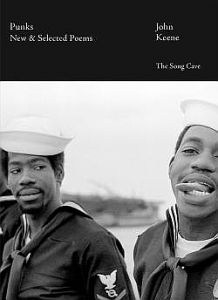 With depth and breadth, PUNKS weaves together historic narratives of loss, lust, and love. The many voices that emerge in these poems—from historic Black personalities, both familial and famous, to the poet’s friends and lovers in gay bars and bedrooms—form a cast of characters capable of addressing desire, oppression, AIDS, and grief through sorrowful songs that “we sing as hard as we live.”
With depth and breadth, PUNKS weaves together historic narratives of loss, lust, and love. The many voices that emerge in these poems—from historic Black personalities, both familial and famous, to the poet’s friends and lovers in gay bars and bedrooms—form a cast of characters capable of addressing desire, oppression, AIDS, and grief through sorrowful songs that “we sing as hard as we live.”
At home in countless poetic forms, PUNKS reconfirms John Keene as one of the most important voices in contemporary poetry.
John Keene is a writer, translator, professor, and artist who was named a MacArthur Fellow in 2018. In 1989, Keene joined the Dark Room Writers Collective, and is a Graduate Fellow of the Cave Canem Writers Workshops. He is the author of Annotations, and Counternarratives, both published by New Directions, as well as several other works, including the poetry collection Seismosis, with artist Christopher Stackhouse, and a translation of Brazilian author Hilda Hilst’s novel Letters from a Seducer. Keene is the recipient of many awards and fellowships—including the Windham-Campbell Prize, the Whiting Foundation Prize, the Republic of Consciousness Prize, and the American Book Award. He teaches at Rutgers University-Newark.
# new poetry
Punks: New & Selected Poems
John Keene
Pub Date:12/1/2021
Publisher: The Song Cave
ISBN: 978-1-73727-752-1
Binding: Paperback
Pages:234
Price: $ 20.00
• fleursdumal.nl magazine
More in: # Punk poetry, #Editors Choice Archiv, - Book News, Archive K-L, Archive K-L
Franz Kafka (1883-1924) groeide op in Praag, waar hij deel uitmaakte van de Duitstalige Joodse gemeenschap en aan de rand van het getto woonde.
Hij bezocht het Duitse gymnasium en studeerde aan de universiteit van Praag. Daar ontmoette hij Max Brod, zijn vriend en latere biograaf.
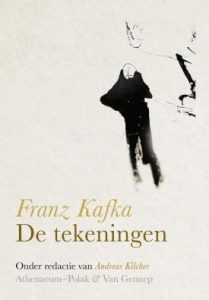 Vanaf 1908 tot 1917 werkte hij als ambtenaar bij een bedrijf dat arbeidsongevallenverzekeringen verzorgde, een baan die hij als een noodzakelijk kwaad beschouwde om zich aan het schrijven te kunnen wijden. Zijn longtuberculose, die hem in 1924 fataal zou worden, deed zich in deze tijd gelden. Gedurende zijn leven had hij enkele korte maar intense relaties, waaronder drie verlovingen, zo blijkt uit enkele postuum uitgegeven brieven. De dames waar hij mee omging komen ook indirect terug in zijn werk. Hij leidde een teruggetrokken leven, maar discussieerde veel binnen de Praagse culturele elite, mede via zijn ‘ontdekker’ Brod.
Vanaf 1908 tot 1917 werkte hij als ambtenaar bij een bedrijf dat arbeidsongevallenverzekeringen verzorgde, een baan die hij als een noodzakelijk kwaad beschouwde om zich aan het schrijven te kunnen wijden. Zijn longtuberculose, die hem in 1924 fataal zou worden, deed zich in deze tijd gelden. Gedurende zijn leven had hij enkele korte maar intense relaties, waaronder drie verlovingen, zo blijkt uit enkele postuum uitgegeven brieven. De dames waar hij mee omging komen ook indirect terug in zijn werk. Hij leidde een teruggetrokken leven, maar discussieerde veel binnen de Praagse culturele elite, mede via zijn ‘ontdekker’ Brod.
Een reconstructie van Kafka’s leven en denken is mogelijk geworden door zijn nalatenschap in de vorm van dagboeken, die hij van 1910 tot 1923 bijhield. Kafka schreef voornamelijk proza, waarvan zijn romans Der Prozess (1925), Das Schloss (1926) en Amerika (1927) de bekendste zijn. Enkele prozavertellingen als Die Verwandlung (1915), Das Urteil (1913) en In der Strafkolonie (1919) hebben later ook hun weg naar het grote publiek gevonden.
Wat Kafka’s werk typeert zijn tegenstellingen als weten en onwetendheid, macht en machteloosheid, loyaliteit en verraad, menselijkheid en verontmenselijking. Hij schetst labyrinten waarin individuen wanhopig naar een uitweg zoeken. De werelden die hij creëert zijn absurd, kennen een heel eigen logica en worden in een droge, zakelijke stijl beschreven. Veel van zijn werk is tijdens zijn leven onvoltooid gebleven, waardoor veel discussie mogelijk is over de bedoelingen van de schrijver. Pas in de jaren dertig van de twintigste eeuw groeide de belangstelling voor zijn werk, dat mede dankzij Max Brod postuum verscheen.
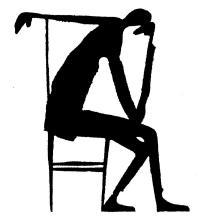 In 2019 werd het Max Brod Archief in de Nationale Bibliotheek van Israël geopend. Tussen de opvallende archiefstukken bevonden zich tot dusver onbekende tekeningen die Franz Kafka maakte in de jaren 1901-1906. Hij tekende, al voor de ontwikkeling van zijn literaire talent, om zich artistiek uit te drukken.
In 2019 werd het Max Brod Archief in de Nationale Bibliotheek van Israël geopend. Tussen de opvallende archiefstukken bevonden zich tot dusver onbekende tekeningen die Franz Kafka maakte in de jaren 1901-1906. Hij tekende, al voor de ontwikkeling van zijn literaire talent, om zich artistiek uit te drukken.
Aan zijn verloofde Felice Bauer schreef hij in 1913: ‘Weet je, ik was ooit een groot tekenaar, maar toen ben ik bij een slechte schilderes schoolse tekenlessen gaan nemen en heb ik mijn hele talent verknoeid. Stel je dat eens voor! […] In die tekeningen heb ik indertijd, het is nu al jaren geleden, meer bevrediging gevonden dan in enige andere bezigheid.’
In Franz Kafka. De tekeningen worden voor het eerst meer dan 200 tekeningen, waarvan 140 nooit eerder zijn gepubliceerd, in een luxe kunstuitgave samengebracht. Deze is samengesteld en van begeleidende essays en een verantwoording voorzien door Andreas Kilcher, Pavel Schmidt en Judith Butler.
Franz Kafka. De tekeningen
Auteur: Franz Kafka
Taal: Nederlands
Vertaald door Willem van Toorn
Uitgever Athenaeum
Hardcover
EAN 9789025313609
1 oktober 2021
336 pagina’s
Illustraties
49,90
# new books
Franz Kafka.
De tekeningen
• fleursdumal.nl magazine
More in: - Book News, - Bookstores, Archive K-L, Archive K-L, Art & Literature News, Franz Kafka, Illustrators, Illustration, Kafka, Franz, Kafka, Franz
Thank you for reading Fleurs du Mal - magazine for art & literature